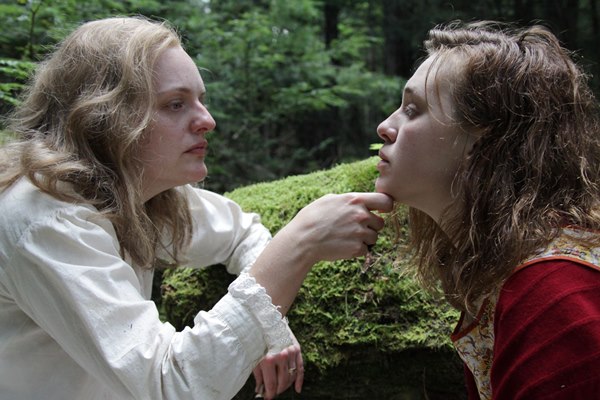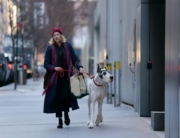
Fans of author Shirley Jackson expecting a standard literary biopic in the tradition of 2003’s Sylvia will be surprised (and not always pleased) by director Josephine Decker’s Sundance winner Shirley, which earlier this year took the Special Jury Award for Auteur Filmmaking. Sarah Gubbin’s screenplay is based not on a biography but on Susan Scarf Merrell’s 2014 eponymous novel, a gothic homage to the writer noted for such horror classics as The Haunting of Hill House.
It’s Jackson’s most notorious story, “The Lottery,” that newly married Rose (Odessa Young) is reading on a train as the film opens. Her husband, Fred (Logan Lerman), thinks the famous ending is creepy, but Rose is aroused: “It’s terrific.” Her excitement prompts a trip to the car’s bathroom for a marital quickie before they arrive in Bennington, VT, where the couple is to stay with Professor Stanley Hyman (Fred is his new teaching assistant) and his wife, Shirley Jackson.
A party is in full swing at the Hymans’ Victorian house, and Shirley (Elizabeth Moss) holds court in the living room, surrounded by admirers and hangers-on. When a guest describes “The Lottery” as anti-Semitic, Stanley interjects, “Shirley never hated a Jew until she met me.” As Stanley (Michael Stuhlbarg in a wonderfully smarmy performance) acidly describes their courtship, Rose senses the tension between the two. Rose’s attempt to ingratiate herself with Shirley by praising “The Lottery” is quickly batted down by the prickly and private writer, who initially sees Rose as just another college girl that her unfaithful husband will seduce.
Rose’s hopes to audit classes at Bennington are thwarted when Stanley asks Rose to help his agoraphobic and deeply depressed wife with the housekeeping and cooking: “How’s your rump roast? I love hot food in hot weather.” The couples settle down into a tense domestic drama that will remind viewers of Who’s Afraid of Virginia Woolf? Stanley and Shirley are, of course, George and Martha, laser-focused on their houseguests’ vulnerabilities. At dinner one evening, Shirley outs Rose’s still-unannounced pregnancy and mocks her marriage, “You were going to tell us about your shotgun wedding.” Later, Stanley dismisses Fred’s dissertation as derivative, asking his mortified assistant, “Have you ever thought of teaching at the high school level?”
But Shirley also uses kindness as a manipulative weapon. She lends Rose books from her library and enlists her help in researching the disappearance of a local college student for a novel that eventually will become 1951’s Hangasman. As the two gradually grow infatuated with each other, Shirley begins to imagine Rose as the missing Paula, while a feverish and restless Rose behaves oddly, flicking fresh eggs off a table and writhing in earthworm-infected mud. Is Rose going mad or finally awakening to her true self?
Stylistically and tonally, Decker tries to present Shirley Jackson’s life like a Shirley Jackson story, though with heavy-handed touches. Young boys throw stones in the street, and suspicious townspeople stare when Rose and Fred first arrive in Bennington. The Hymans’ old house creaks and groans like Hill House. Thunder cracks and bells toll in Tamar-kali’s jarring score, and a spooky full moon is shot through bare winter trees.
Despite frequent references to the occult (tarot cards, witchcraft, fertility offerings, poisonous mushrooms), this movie is not particularly horrific or suspenseful. In fact, it is a rather dull film about deeply abrasive people, the excellent performances notwithstanding. Moss is good, but we have seen her in this kind of thrashing, condescending character before in Her Smell. Promising newcomer Young more than holds her own against the showier Moss. Stuhlbarg has great fun chewing up the scenery as the exploitative, controlling, and selfish Stanley, but Lerman has nothing to do except flirt off-screen with coeds.
Maybe Jackson’s four children should be grateful that they were written out of this overlong film that doesn’t flatter their mother and deprives her of the dark, unsettling humor that propelled her best-selling books about motherhood in mid-century America, Life Among the Savages (1953) and Raising Demons (1957).
















The Nemsers, Fred and Rose, are also Jewish in the book, but of course in the movie they’ve been de-Jewed since they’re young and hot and Stanley is an old beardo, even though Fred is still played by a Jewish actor.
Actors with two Jewish parents: Mila Kunis, Natalie Portman, Logan Lerman, Paul Rudd, Joseph Gordon-Levitt, Bar Refaeli, Anton Yelchin, Jennifer Jason Leigh, Emmanuelle Chriqui, Adam Brody, Kat Dennings, Gabriel Macht, Sarah Michelle Gellar, Erin Heatherton, Lisa Kudrow, Lizzy Caplan, Gal Gadot, Debra Messing, Gregg Sulkin, Jason Isaacs, Jon Bernthal, Robert Kazinsky, Melanie Laurent, Esti Ginzburg, Shiri Appleby, Justin Bartha, Margarita Levieva, James Wolk, Elizabeth Berkley, Halston Sage, Seth Gabel, Corey Stoll, Michael Vartan, Mia Kirshner, Alden Ehrenreich, Julian Morris, Asher Angel, Debra Winger, Eric Balfour, Dan Hedaya, Emory Cohen, Corey Haim, Scott Mechlowicz, Harvey Keitel, Odeya Rush, William Shatner, Leonard Nimoy.
Aaron Taylor-Johnson is Jewish, too (though I don’t know if both of his parents are).
Actors with Jewish mothers and non-Jewish fathers: Timothée Chalamet, Jake Gyllenhaal, Dave Franco, James Franco, Scarlett Johansson, Daniel Day-Lewis, Daniel Radcliffe, Alison Brie, Eva Green, Joaquin Phoenix, River Phoenix, Emmy Rossum, Ryan Potter, Rashida Jones, Jennifer Connelly, Sofia Black D’Elia, Nora Arnezeder, Goldie Hawn, Ginnifer Goodwin, Judah Lewis, Brandon Flynn, Amanda Peet, Eric Dane, Jeremy Jordan, Joel Kinnaman, Ben Barnes, Patricia Arquette, Kyra Sedgwick, Dave Annable, and Harrison Ford (whose maternal grandparents were both Jewish, despite those Hanukkah Song lyrics).
Actors with Jewish fathers and non-Jewish mothers, who themselves were either raised as Jewish and/or identify as Jewish: Ezra Miller, Gwyneth Paltrow, Zac Efron, Alexa Davalos, Nat Wolff, Nicola Peltz, James Maslow, Josh Bowman, Andrew Garfield, Winona Ryder, Michael Douglas, Ben Foster, Jamie Lee Curtis, Nikki Reed, Jonathan Keltz, Paul Newman, David Corenswet.
Oh, and Ansel Elgort’s father is Jewish, though I don’t know how Ansel was raised. Robert Downey, Jr., Sean Penn, and Ed Skrein were also born to Jewish fathers and non-Jewish mothers. Armie Hammer, Chris Pine, Emily Ratajkowski, Mark-Paul Gosselaar, and Finn Wolfhard are part Jewish.
Actors with one Jewish-born parent and one parent who converted to Judaism: Dianna Agron, Sara Paxton (whose father converted, not her mother), Alicia Silverstone, Jamie-Lynn Sigler.